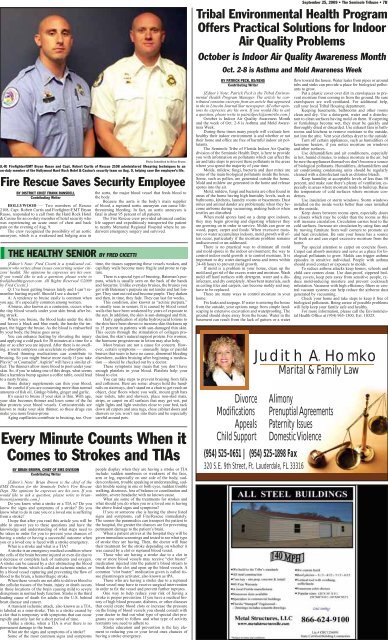Youth Honored for Scholastic Achievements - Seminole Tribe of ...
Youth Honored for Scholastic Achievements - Seminole Tribe of ...
Youth Honored for Scholastic Achievements - Seminole Tribe of ...
You also want an ePaper? Increase the reach of your titles
YUMPU automatically turns print PDFs into web optimized ePapers that Google loves.
Photo Submitted by Brian Brown<br />
(L-R) Firefighter/EMT Bryan Russo and Capt. Robert Curtis <strong>of</strong> Rescue 2108 administered lifesaving techniques to an<br />
on-duty member <strong>of</strong> the Hollywood Hard Rock Hotel & Casino’s security team on Aug. 9, helping save the employee’s life.<br />
Fire Rescue Saves Security Employee<br />
BY DISTRICT CHIEF FRANK RANSDELL<br />
Contributing Writer<br />
HOLLYWOOD — Two members <strong>of</strong> Rescue<br />
2108, Capt. Robert Curtis and Firefighter/EMT Bryan<br />
Russo, responded to a call from the Hard Rock Hotel<br />
& Casino <strong>for</strong> an on-duty member <strong>of</strong> hotel security who<br />
was experiencing an acute onset <strong>of</strong> chest and back<br />
pain on the evening <strong>of</strong> Aug. 9.<br />
The crew recognized the possibility <strong>of</strong> an aortic<br />
aneurysm, which is a weakened and bulging area in<br />
THE HEALTHY SENIOR BY FRED CICETTI<br />
[Editor’s Note: Fred Cicetti is a syndicated columnist<br />
who writes about issues concerning senior citizens’<br />
health. The opinions he expresses are his own.<br />
If you would like to ask a question, please write to<br />
fred@healthygeezer.com. All Rights Reserved ©2009<br />
by Fred Cicetti.]<br />
Q: I’ve been getting bruises lately and I can’t remember<br />
hurting myself. Should I see a doctor?<br />
A: A tendency to bruise easily is common when<br />
you age. It’s especially common among women.<br />
A bruise, also known as a contusion, occurs when<br />
the tiny blood vessels under your skin break after being<br />
struck.<br />
When you bruise, the blood leaks under the skin<br />
and leaves a black and blue mark; the harder the impact,<br />
the bigger the bruise. As the blood is reabsorbed<br />
by your body, the bruise goes away.<br />
You can enhance healing by elevating the injury<br />
and applying a cold pack <strong>for</strong> 30 minutes at a time <strong>for</strong> a<br />
day or so after you are injured. After there is no swelling,<br />
a warm compress can accelerate re-absorption.<br />
Blood thinning medications can contribute to<br />
bruising. So you might bruise more easily if you take<br />
Plavix ® or Coumadin ® . Aspirin ® will have a similar effect.<br />
The thinners allow more blood to pool under your<br />
skin. So, if you’re taking one <strong>of</strong> this drugs, what seems<br />
like a harmless bump against a c<strong>of</strong>fee table, could lead<br />
to a nasty bruise.<br />
Some dietary supplements can thin your blood,<br />
too. Be careful if you are consuming more than normal<br />
amounts <strong>of</strong> fish oil, Ginkgo biloba, ginger and garlic.<br />
It’s easier to bruise if your skin is thin. With age,<br />
your skin becomes thinner and loses some <strong>of</strong> the fat<br />
that protects your blood vessels. Corticosteroids are<br />
known to make your skin thinner, so these drugs can<br />
make you more bruise-prone<br />
Aging capillaries contribute to bruising, too. Over<br />
[Editor’s Note: Brian Brown is the chief <strong>of</strong> the<br />
EMS Division <strong>for</strong> the <strong>Seminole</strong> <strong>Tribe</strong>’s Fire Rescue<br />
Dept. The opinions he expresses are his own. If you<br />
would like to ask a question, please write to brianbrown@semtribe.com.]<br />
Do you know what a stroke or a TIA is? Do you<br />
know the signs and symptoms <strong>of</strong> a stroke? Do you<br />
know what to do in case you or a loved one is suffering<br />
from a stroke?<br />
I hope that after you read this article you will be<br />
able to answer yes to these questions and have the<br />
knowledge and understanding <strong>of</strong> what steps need to<br />
be taken in order <strong>for</strong> you to prevent your chances <strong>of</strong><br />
having a stroke or having a successful outcome when<br />
you or a loved one is faced with a stroke emergency.<br />
What is a stroke and what is a TIA?<br />
A stroke is an emergency medical condition where<br />
the cells <strong>of</strong> the brain become injured or even die due to<br />
a decrease or complete lack <strong>of</strong> nutrients and oxygen.<br />
A stroke can be caused by a clot obstructing the blood<br />
flow to the brain, which is called an ischemic stroke, or<br />
by a blood vessel rupturing and preventing the flow <strong>of</strong><br />
blood to the brain, a hemorrhagic stroke.<br />
When these vessels are not able to deliver blood to<br />
the cellular tissues <strong>of</strong> the brain, injury or death occurs<br />
in those locations <strong>of</strong> the brain causing mild to severe<br />
disruptions in normal body function. Stroke is the third<br />
leading cause <strong>of</strong> death <strong>for</strong> adults in the U.S. behind<br />
heart disease and cancer.<br />
A transient ischemic attack, also known as a TIA,<br />
is labeled as a mini-stroke. This is a stroke caused by<br />
a clot that is temporary with symptoms that can occur<br />
rapidly and only last <strong>for</strong> a short period <strong>of</strong> time.<br />
Unlike a stroke, when a TIA is over there is no<br />
permanent damage to the brain.<br />
What are the signs and symptoms <strong>of</strong> a stroke?<br />
Some <strong>of</strong> the most common signs and symptoms<br />
time, the tissues supporting these vessels weaken, and<br />
capillary walls become more fragile and prone to rupture.<br />
There is a special type <strong>of</strong> bruising, Bateman’s purpura,<br />
which is usually seen on the back <strong>of</strong> the hands<br />
and <strong>for</strong>earms. Unlike everyday bruises, the bruises you<br />
get with Bateman’s purpura are not tender and last longer.<br />
They start out red and become purple. They darken<br />
and then, in time, they fade. They can last <strong>for</strong> weeks.<br />
This condition, also known as “actinic purpura,”<br />
is usually seen in seniors. It is caused by blood vessel<br />
walls that have been weakened by years <strong>of</strong> exposure to<br />
the sun. In addition, the skin is sun-damaged and thin.<br />
Daily application <strong>of</strong> alpha hydroxyacid lotions to<br />
the skin have been shown to increase skin thickness up<br />
to 15 percent in patients with sun-damaged thin skin.<br />
This occurs through the stimulation <strong>of</strong> collagen production,<br />
the skin’s natural support protein. For women,<br />
the hormone progesterone in lotion may also help.<br />
Most bruises are not a cause <strong>for</strong> concern. However,<br />
certain symptoms — unusually large or painful<br />
bruises that seem to have no cause, abnormal bleeding<br />
elsewhere, sudden bruising after beginning a medication<br />
— should be checked out by a doctor.<br />
These symptoms may mean that you don’t have<br />
enough platelets in your blood. Platelets help your<br />
blood to clot.<br />
You can take steps to prevent bruising from falls<br />
and collisions. Here are some: always hold the handrails<br />
on stairways, don’t stand on a chair to get reach an<br />
object, clear floors where you walk, mount grab bars<br />
near toilets, tubs and showers, place non-skid mats,<br />
strips, or carpet on all surfaces that may get wet, put<br />
night lights and light switches close to your bed, tack<br />
down all carpets and area rugs, close cabinet doors and<br />
drawers so you won’t run into them and be especially<br />
careful around pets.<br />
Every Minute Counts When it<br />
Comes to Strokes and TIAs<br />
BY BRIAN BROWN, CHIEF OF EMS DIVISION<br />
Contributing Writer<br />
the aorta, the major blood vessel that feeds blood to<br />
the body.<br />
Because the aorta is the body’s main supplier<br />
<strong>of</strong> blood, a ruptured aortic aneurysm can cause lifethreatening<br />
bleeding. In fact, an aortic aneurysm is<br />
fatal in about 95 percent <strong>of</strong> all patients.<br />
The Fire Rescue crew provided advanced cardiac<br />
life support and expeditiously transported the patient<br />
to nearby Memorial Regional Hospital where he underwent<br />
emergency surgery and survived.<br />
people display when they are having a stroke or TIA<br />
include: sudden numbness or weakness <strong>of</strong> the face,<br />
arm or leg, especially on one side <strong>of</strong> the body, sudden<br />
confusion, trouble speaking or understanding, sudden<br />
trouble seeing in one or both eyes, sudden trouble<br />
walking, dizziness, loss <strong>of</strong> balance or coordination and<br />
sudden, severe headache with no known cause.<br />
What are some <strong>of</strong> the treatments <strong>for</strong> strokes and<br />
what should you do when you or a loved one is having<br />
the above listed signs and symptoms?<br />
If you or someone else is having the above listed<br />
signs and symptoms, call Fire/Rescue immediately.<br />
The sooner the paramedics can transport the patient to<br />
the hospital, the greater the chances are <strong>for</strong> preventing<br />
permanent damage to the patient’s brain.<br />
When a patient arrives at the hospital they will be<br />
given immediate screenings and tested to see what type<br />
<strong>of</strong> stroke they are having. Then, the doctor will base<br />
their treatment <strong>for</strong> the stroke depending on whether it<br />
was caused by a clot or ruptured blood vessel.<br />
Those who are having a stroke due to a clot in<br />
one or more blood vessels may receive “clot buster”<br />
medication injected into the patient’s blood stream to<br />
break down the clot and open up the blood vessels. A<br />
common “clot buster” medication given is called tissue<br />
plasminogen activator, also known as tPA.<br />
Those who are having a stroke due to a ruptured<br />
blood vessel may have to receive surgical intervention<br />
in order to fix the vessel and prevent further ruptures.<br />
One way to help reduce your risk <strong>of</strong> having a<br />
stroke is proper prevention. If you have a medical history<br />
<strong>of</strong> high blood pressure, diabetes, or other diseases<br />
that could create blood clots or increase the pressure<br />
on the lining <strong>of</strong> blood vessels you should consult with<br />
your doctor to find out what type <strong>of</strong> special diet programs<br />
you need to follow and what type <strong>of</strong> activity<br />
restraints you need to adhere to.<br />
Stroke education and prevention is the key element<br />
to reducing you or your loved ones chances <strong>of</strong><br />
having a stroke emergency.<br />
[Editor’s Note: Patrick Peck is the Tribal Environmental<br />
Health Program Manager. The article he contributed<br />
contains excerpts from an article that appeared<br />
in the in Lincoln Journal Star newspaper. All other opinions<br />
he expresses are his own. If you would like to ask<br />
a question, please write to patrickpeck@semtribe.com.]<br />
October is Indoor Air Quality Awareness Month<br />
and the week <strong>of</strong> Oct. 2-8 is Asthma and Mold Awareness<br />
Week.<br />
During these times many people will evaluate how<br />
healthy their indoor environment is and whether or not<br />
their home and <strong>of</strong>fice are free <strong>of</strong> harmful indoor air pollutants.<br />
The <strong>Seminole</strong> <strong>Tribe</strong> <strong>of</strong> Florida Indoor Air Quality<br />
division <strong>of</strong> the <strong>Seminole</strong> Health Dept. is here to provide<br />
you with in<strong>for</strong>mation on pollutants which can affect the<br />
air and take steps to prevent these pollutants in the areas<br />
where you spend the majority <strong>of</strong> your time.<br />
Molds, mildew, fungi, bacteria and dust mites are<br />
some <strong>of</strong> the main biological pollutants inside the house.<br />
Some, such as pollen, are generated outside the home.<br />
Mold and mildew are generated in the home and release<br />
spores into the air.<br />
Mold, mildew, fungi and bacteria are <strong>of</strong>ten found in<br />
areas <strong>of</strong> the home having high humidity levels, such as<br />
bathrooms, kitchens, laundry rooms or basements. Dust<br />
mites and animal dander are problematic when they become<br />
airborne during vacuuming, making beds or when<br />
textiles are disturbed.<br />
When mold spores land on a damp spot indoors,<br />
they may begin growing and digesting whatever they<br />
are growing on in order to survive. Molds can grow on<br />
wood, paper, carpet and foods. When excessive moisture<br />
or water accumulates indoors, mold growth will <strong>of</strong>ten<br />
occur, particularly if the moisture problem remains<br />
undiscovered or un-addressed.<br />
There is no practical way to eliminate all mold<br />
and mold spores in the indoor environment; the way to<br />
control indoor mold growth is to control moisture. It is<br />
important to dry water damaged areas and items within<br />
24-48 hours to prevent mold growth.<br />
If mold is a problem in your home, clean up the<br />
mold and get rid <strong>of</strong> the excess water and moisture. Wash<br />
mold <strong>of</strong>f hard surfaces with detergent, water and a disinfectant,<br />
and dry completely. Absorbent materials, such<br />
as ceiling tiles and carpets, can become moldy and may<br />
have to be replaced.<br />
There are many ways to control moisture in your<br />
home:<br />
Fix leaks and seepage. If water is entering the house<br />
from the outside, your options range from simple landscaping<br />
to extensive excavation and waterpro<strong>of</strong>ing. The<br />
ground should slope away from the house. Water in the<br />
basement can result from the lack <strong>of</strong> gutters or a water<br />
Divorce<br />
Modifications<br />
Appeals<br />
Child Support<br />
September 25, 2009 • The <strong>Seminole</strong> Tribune • 7B<br />
Tribal Environmental Health Program<br />
Offers Practical Solutions <strong>for</strong> Indoor<br />
Air Quality Problems<br />
October is Indoor Air Quality Awareness Month<br />
Oct. 2-8 is Asthma and Mold Awareness Week<br />
BY PATRICK PECK, RS/REHS<br />
Contributing Writer<br />
flow toward the house. Water leaks from pipes or around<br />
tubs and sinks can provide a place <strong>for</strong> biological pollutants<br />
to grow.<br />
Put a plastic cover over dirt in crawlspaces to prevent<br />
moisture from coming in from the ground. Be sure<br />
crawlspaces are well-ventilated. For additional help,<br />
call your local Tribal Housing department.<br />
Keeping basements, bathrooms and other rooms<br />
clean and dry. Use a detergent, water and a disinfectant<br />
to clean surfaces having mold on them. If carpeting<br />
or furnishings become wet, they must be quickly and<br />
thoroughly dried or discarded. Use exhaust fans in bathrooms<br />
and kitchens to remove moisture to the outside,<br />
not into the attic. Vent your clothes dryer to the outside.<br />
Turn <strong>of</strong>f certain appliances, such as humidifiers or<br />
kerosene heaters, if you notice moisture on windows<br />
and other surfaces.<br />
Use dehumidifiers and air conditioners, especially<br />
in hot, humid climates, to reduce moisture in the air, but<br />
be sure the appliances themselves don’t become a source<br />
<strong>of</strong> biological pollutants. Humidifiers, dehumidifiers and<br />
air conditioning condensing units should be regularly<br />
cleaned with a disinfectant such as chlorine bleach.<br />
Keep humidity at acceptable levels <strong>of</strong> less than 50<br />
percent, and make sure there’s plenty <strong>of</strong> ventilation, especially<br />
in areas where moisture tends to build up. Raise<br />
the temperature <strong>of</strong> cold surfaces where moisture condenses.<br />
Use insulation or storm windows. Storm windows<br />
installed on the inside works better than ones installed<br />
on the outside.<br />
Keep doors between rooms open, especially doors<br />
to closets which may be colder than the rooms as this<br />
will increase circulation. Circulation carries heat to the<br />
cold surfaces. Increase air circulation by using fans and<br />
by moving furniture from wall corners to promote air<br />
and heat circulation. Be sure your house has a source<br />
<strong>of</strong> fresh air and can expel excessive moisture from the<br />
home.<br />
Pay special attention to carpet on concrete floors.<br />
Carpet can absorb moisture and serve as a place <strong>for</strong> biological<br />
pollutants to grow. Molds can trigger asthma<br />
episodes in sensitive individual. People with asthma<br />
should avoid contact or exposure to molds.<br />
To reduce asthma attacks keep homes, schools and<br />
child care centers clean. Use dust-pro<strong>of</strong>, zippered bedding<br />
covers, keep pets away from sensitive people, reduce<br />
mold-inducing moisture and prevent cockroach<br />
infestation. Vacuums with high efficiency filters or central<br />
vacuum systems can help reduce the airborne dust<br />
generated by vacuuming.<br />
Check your home and take steps to keep it free <strong>of</strong><br />
biological pollutants. Being aware <strong>of</strong> possible problems<br />
will help keep your family safe and healthy.<br />
For more in<strong>for</strong>mation, please call the Environmental<br />
Health Office at (954) 965-1300, Ext. 10325.<br />
Judith A. Homko<br />
Marital & Family Law<br />
Alimony<br />
Prenuptial Agreements<br />
Paternity Issues<br />
Domestic Violence<br />
(954) 525-0651 | (954) 525-1898 Fax<br />
320 S.E. 9th Street, Ft. Lauderdale, FL 33316

















